- Home
- Anthony Trollope
The Bertrams
The Bertrams Read online
E-text prepared by Delphine Lettau and Joseph E. Loewenstein, M.D.
THE BERTRAMS.
A Novel.
by
ANTHONY TROLLOPE
Author of "Barchester Towers," "Doctor Thorne," etc.
In Three Volumes
VOL. I.
London:Chapman & Hall, 193 Piccadilly.1859.
[The right of Translation is reserved.]
London: Printed by W. Clowes and Sons, Stamford Street.
CONTENTS OF VOL. I.
I. VAE VICTIS! II. BREAKFAST AND LUNCH. III. THE NEW VICAR. IV. OUR PRIMA DONNA. V. THE CHOICE OF A PROFESSION. VI. JERUSALEM. VII. THE MOUNT OF OLIVES. VIII. SIR LIONEL BERTRAM. IX. MISS TODD'S PICNIC. X. THE EFFECTS OF MISS TODD'S PICNIC. XI. VALE VALETE. XII. GEORGE BERTRAM DECIDES IN FAVOUR OF THE BAR. XIII. LITTLEBATH. XIV. WAYS AND MEANS. XV. MR. HARCOURT'S VISIT TO LITTLEBATH.
THE BERTRAMS.
CHAPTER I.
VAE VICTIS!
This is undoubtedly the age of humanity--as far, at least, as Englandis concerned. A man who beats his wife is shocking to us, and acolonel who cannot manage his soldiers without having them beaten isnearly equally so. We are not very fond of hanging; and some of usgo so far as to recoil under any circumstances from taking the bloodof life. We perform our operations under chloroform; and it has evenbeen suggested that those schoolmasters who insist on adhering insome sort to the doctrines of Solomon should perform their operationsin the same guarded manner. If the disgrace be absolutely necessary,let it be inflicted; but not the bodily pain.
So far as regards the low externals of humanity, this is doubtless ahumane age. Let men, women, and children have bread; let them have ifpossible no blows, or, at least, as few as may be; let them also bedecently clothed; and let the pestilence be kept out of their way.In venturing to call these low, I have done so in no contemptuousspirit; they are comparatively low if the body be lower than themind. The humanity of the age is doubtless suited to its materialwants, and such wants are those which demand the promptest remedy.But in the inner feelings of men to men, and of one man's mind toanother man's mind, is it not an age of extremest cruelty?
There is sympathy for the hungry man; but there is no sympathy forthe unsuccessful man who is not hungry. If a fellow mortal be ragged,humanity will subscribe to mend his clothes; but humanity willsubscribe nothing to mend his ragged hopes so long as his outsidecoat shall be whole and decent.
To him that hath shall be given; and from him that hath not shallbe taken even that which he hath. This is the special text that wedelight to follow, and success is the god that we delight to worship."Ah! pity me. I have struggled and fallen--struggled so manfully, yetfallen so utterly--help me up this time that I may yet push forwardonce again!" Who listens to such a plea as this? "Fallen! do you wantbread?" "Not bread, but a kind heart and a kind hand." "My friend, Icannot stay by you; I myself am in a hurry; there is that fiend ofa rival there even now gaining a step on me. I beg your pardon; butI will put my foot on your shoulder--only for one moment. _Occupetextremum scabies._"
Yes. Let the devil take the hindmost; the three or four hindmost ifyou will; nay, all but those strong-running horses who can forcethemselves into noticeable places under the judge's eye. This is thenoble shibboleth with which the English youth are now spurred onto deeds of--what shall we say?--money-making activity. Let everyplace in which a man can hold up his head be the reward of someantagonistic struggle, of some grand competitive examination. Let usget rid of the fault of past ages. With us, let the race be ever tothe swift; the victory always to the strong. And let us always beracing, so that the swift and strong shall ever be known among us.But what, then, for those who are not swift, not strong? _Vae victis!_Let them go to the wall. They can hew wood probably; or, at any rate,draw water.
Were we to ask Lord Derby, or Lord Palmerston, or to consult theshade of Lord George Bentinck--or to go to those greater authoritieson the subject, Mr. Scott, for instance, and the family of theDays--we should, I believe, be informed that the race-horse requiresa very peculiar condition. It is not to be obtained quickly, and,when obtained, will fit the beast for no other than that one purposeof running races. Crucifix was never good at going in a cab; Ilionenever took her noble owner down to the house of Parliament; nor hasToxopholite been useful in Leicestershire.
But, nevertheless, let all our work be done by race-horses; all, atleast, that shall be considered honourable. Let us have strength andspeed. And how shall we know who are strong and swift if we do nottrain our horses to run against each other? But this early racingwill hardly produce that humanity of spirit of which we now deplorethe want. "The devil take the hindmost" is the very essence of theyoung man's book of proverbs. The devil assuredly will take all thehindmost. None but the very foremost can enter the present heaven ofgood things. Therefore, oh my brother, my friend, thou companion ofmy youth! may the devil take thee; thee quickly, since it needs mustbe thee or me.
_Vae victis_--alas! for these hindmost ones; there are so many ofthem! The skim-milk will always be so much more in quantity than thecream. With us at present cream is required for everything; nothingcan be well done now unless it be done by cream of some sort. Thatmilk has been skimmed; the cream has been taken away. No matter; skimit again. There shall be something yet which we will call cream.Competitive examination will produce something that shall look tobe strong; that shall be swift, if it be only for a start of twentyyards.
This is the experiment of the present day. Wise men say that whennothing but cream is accepted, all mankind, all boykind rather, willprepare itself for a skimming of some sort; and that the quantity ofcream produced will be immense. It is only done as an instigation toeducation. Much may be said in opposition to this; but nothing shallbe said here. It is merely of the cruelty of spirit that is thusengendered that we now speak. Success is the only test of merit.Words have lost their old significance, and to deserve only is notmeritorious. _Vae victis!_ there are so many of them!
"Thompson," says Johnson, the young poet, when he has at lastsucceeded in getting the bosomest of his friends alone into hischamber with him, "have you happened to look at my Iphigenia yet?"
Thompson can't say that he has. He has been busy; has had so manywater-parties; and then, somehow, he doesn't think that he is verypartial to modern poetry on subjects of old mythology. Of course,however, he means to read it--some of these days.
"I wish you would," says Johnson, tendering a copy of the thinvolume. "I really wish you would; and let me have your candidopinion. The press certainly have not noticed it much, and what theyhave said has been very luke-warm."
"I am sorry for that," says Thompson, looking grave.
"And I did my best with it too. You would hardly believe how hardI worked at it. There is not a line that has not been weighed andwritten, perhaps, three times over. I do not think I am conceited;but I cannot but believe that there is something in it. The reviewersare so jealous! if a man has not a name, they will give him creditfor nothing; and it is so hard to begin."
"I am sure it is," says Thompson.
"I don't expect fame; and as for money, of course I don't think ofthat. But I should like to know that it had been read by one or twopersons who could understand it. I have given to it the best ofmy time, the best of my labour. I cannot but think that there issomething in it." Thus pleads the unsuccessful one for mercy.
And thus answers to him the successful one, with no grain of mercy inhis composition:--"My dear Johnson, my maxim is this, that in thisworld every man gets in the long run exactly what he deserves--"
"Did Milton get what he deserved?"
"These are not the days of Milton. I don't want to hurt yourfeelings; but old friends as we are, I s
hould not forgive myself if Ididn't tell you what I really think. Poetry is all very well; but youcan't create a taste for it if it doesn't exist. Nobody that I knowof cares a d---- for Iphigenia."
"You think I should change my subject, then?"
"To tell you the truth, I think you should change your trade. This isthe third attempt, you know. I dare say they are very good in theirway; but if the world liked them, the world would have found it outby this time. '_Vox populi, vox Dei_'--that is my motto--I don'ttrust my own judgment; I trust that of the public. If you will takemy advice, you will give up Iphigenia and the rest of them. You seeyou are doing nothing whatever at the bar," &c., &c.
And thus Johnson is left, without a scrap of comfort, a word ofconsolation, a spark of sympathy; and yet he had given to thatIphigenia of his the best that was in him to give. Had his publishersold ten thousand copies of it, how Thompson would have admired it!how he would have pressed the poet in his arms, and have given himchampagne up at Richmond! But who now has sympathy for failure? Tofail is to be disgraced. _Vae victis!_
There is something very painful in these races, which we English arealways running, to one who has tenderness enough to think of the ninebeaten horses instead of the one who has conquered. Look at thatlist which has just come out after our grand national struggle atCambridge. How many wranglers are there? Thirty, shall we say? andit is always glorious to be a wrangler. Out of that thirty there isprobably but one who has not failed, who is not called on to submitto the inward grief of having been beaten. The youth who is second,who has thus shown himself to be possessed of a mass of eruditionsufficient to crush an ordinary mind to the earth, is ready to eathis heart with true bitterness of spirit. After all his labour, hismidnight oil, his many sleepless nights, his deserted pleasures, hisracking headaches, Amaryllis abandoned, and Neaera seen in the arms ofanother--! After all this, to be beaten by Jones! Had it been Greenor Smith he could have borne it. Would it not have been better to doas others had done? he could have been contented to have gone out inthe crowd; but there is nothing so base as to be second--and thensecond to Jones!
Out of the whole lot, Jones alone is contented; and he is told byhis physician that he must spend his next two winters at Cairo. Theintensity of his application has put his lungs into very seriousjeopardy.
It was at Oxford, in the year 184--, that a young man sat inhis college-rooms at Balliol a wretched victim to unsuccessfulcompetition. It had been everything to him to come out as a first inclassics, and he had dared to dream even of a double-first. But hehad failed in both. The lists had just appeared, and he was only asecond-class man. Now, a second-class man is not much thought of atBalliol, and he had lost his chance of an immediate fellowship.
But this was perhaps hardly the worst of it. Arthur Wilkinson, forsuch was this gentleman's name, had hitherto run his race in lifealongside a friend and rival named George Bertram; and in almostevery phase of life had hitherto been beaten. The same moment thathad told Wilkinson of his failure had told him also that Bertramhad obtained the place he had so desired. Bertram was the onlydouble-first man of his year.
As these two young men will play the foremost parts in the followingpages, I will endeavour to explain, in as few words as possible, whoeach of them was. As Bertram seems to have been the favourite withfortune, I will begin with him.
His father at the time alluded to was still alive, but his son Georgehad seen but little of him. Sir Lionel Bertram had been a soldierof fortune, which generally, I believe, means a soldier without afortune, and in that capacity he was still in some sort fighting hiscountry's battles. At the present moment he held a quasi-militaryposition in Persia, where he had been for the last five years, andpreviously to that he had served in Canada, India, the Cape of GoodHope, and on some special mission at Monte Video. He had, therefore,seen a good deal of the world; but very little of his only child.Mrs. Bertram, George's mother, had died early in life, and Mr.(afterwards Sir Lionel) Bertram had roamed the world free from allencumbrances.
The Rev. Arthur Wilkinson, vicar of Hurst Staple, on the bordersof Hampshire and Berkshire, had married a first-cousin of Mrs.Bertram's; and when young George Bertram, at the age of nine, wastossing about the world rather in want of a fixed home, Mr. Wilkinsonundertook to give him that home, and to educate him with his owneldest child till they should both be sent to some school. Forthree years George Bertram lived at Hurst Staple, and was educatedaccordingly. During these years he used to go annually for one monthto the house of an uncle, who in due time will also be introduced tothe reader; and therefore, not unnaturally, this month was regardedby the boy as his holidays.
Now, it may as well be explained in this place that Sir LionelBertram, though a very gallant man, and peculiarly well adapted todo business with outlandish people, had never succumbed to a habitof punctuality in pecuniary matters. An arrangement had been perhapsrather named than made, that one hundred and thirty pounds per annumshould be paid for young Bertram's needs; and as this was to includepocket-money, clothing, and washing, as well as such trifles as theboy's maintenance and education, perhaps the bargain was not a veryhard one as regarded Sir Lionel. The first seventy-five pounds werepaid; but after that, up to the end of the second year, Mr. Wilkinsonhad received no more. As he was a poor man, with six children of hisown, and little besides his living, he then thought it better tomention the matter to Sir Lionel's brother in London. The balancewas instantly paid, and Mr. Wilkinson had no further trouble on thathead. Nor had he much trouble on any other head as regarded youngBertram. The lad was perhaps not fit to be sainted, and gave Mrs.Wilkinson the usual amount of trouble as regarded his jackets andpantaloons; but, on the whole, he was a good boy, free and generousin his temper, quick in his parts, affectionate in disposition, andfull of humour. Those who examined him most closely (among whom,perhaps, Mr. Wilkinson was not included) might have observed thathe was hardly as steady as he might have been in his likings anddislikings; that he made too little of the tasks which he learntwithout trouble; and that, in fact, he was not sufficientlysolicitous about anything. He was, however, undoubtedly a lad ofgreat promise, and one of whom any father might have been proud.
He was not a handsome boy, nor did he become a handsome man. His facewas too solid, his cheeks too square, and his forehead too heavy; buthis eyes, though small, were bright, and his mouth was wonderfullymarked by intelligence. When he grew to be a man, he wore no beard,not even the slightest apology for a whisker, and this perhapsadded to the apparent heaviness of his face; but he probably bestunderstood his own appearance, for in those days no face bore on itmore legible marks of an acute mind.
At the age of twelve, he was sent to Winchester, and as his holidayswere still passed with his uncle, he then ceased to regard HurstStaple as his home. Twice a year, as he went up to town, he stayedthere for a couple of days; but he was soon looked on as a visitor,and the little Wilkinsons no longer regarded him as half a brother inreality and quite a brother in love.
Arthur Wilkinson was very nearly of the same age. He was just olderthan young Bertram--by three months or so; just sufficiently togive to Wilkinson a feeling of seniority when they first met, anda consciousness that as he was the senior in age, he should be thesenior in scholastic lore. But this consciousness Wilkinson was notable to attain; and during all the early years of his life, he wasmaking a vain struggle to be as good a man as his cousin; that is,as good in scholarship, as good in fighting, as good in play, and asgood in spirit.
In looks, at any rate, Arthur was superior to George; and muchconsolation did his mother receive from this conviction. YoungWilkinson was a very handsome lad, and grew up to be a handsome man;but his beauty was of that regular sort which is more pleasing in aboy than in a man. He also was an excellent lad, and no parent couldbe so thankless as to be other than proud of him. All men said allgood things of him, so that Mr. Wilkinson could not but be contented.Nevertheless, one would always wish to see one's own son not lessbright than one's friend's son.
&nbs
p; Arthur Wilkinson was also sent to Winchester. Perhaps it would havebeen better for the cousins that they should have gone to differentschools. The matter, however, had been left to Mr. Wilkinson, andas he thought Winchester good for his own son, he naturally thoughtthe same school good for Sir Lionel's son. But Bertram was enteredas a commoner, whereas Wilkinson was in the college. Those who knowWinchester will understand, that though, as regarded school businessand school hours, they were at the same establishment, they were nottogether at the much more important hours of eating, sleeping, andplaying. They did not cease to be friends, but they did cease tolive together as friends generally do live when educated at the sameschool.
At Winchester they both did fairly well; but Bertram did much thebest. He got the prizes, whereas his cousin did but nearly get them.He went up from class to class above the other, and when the lasttussle for pride of place came on at the close of their boyishcareer, Bertram was the victor. He stood forth to spout out Latinhexameters, and to receive the golden medal, while Wilkinson had noother privilege but to sit still and listen to them.
I believe masters but seldom recognize the agony of spirit with whichboys endure being beaten in these contests. Boys on such subjectsare very reticent; they hardly understand their own feelings enoughto speak of them, and are too much accustomed both to ridicule andcensure to look anywhere for sympathy. A favourite sister may perhapsbe told of the hard struggle and the bitter failure, but not a wordis said to any one else. His father, so thinks the boy, is angry athis failure; and even his mother's kisses will hardly be warmed bysuch a subject. We are too apt to think that if our children eatpudding and make a noise they require no sympathy. A boy may fail atschool, and afterwards eat much pudding, and make much noise; but,ah! how his young heart may sigh for some one to grieve with him overhis failures!
Wilkinson was unfortunate at school. It was a great object with hisfather that he should get a scholarship at New College, to which, asall the world knows, his path lay through the college of Winchester.When his time came, he was all but successful--but he was notsuccessful. The vacancies in his year were few in number, only three,and of these two were preoccupied, according to the then rule of theplace, by those heaven-born Wykamists, called founder's kin He wasonly the second best on the list, and lost the prize.
Bertram, having been a commoner, had had no right to think of NewCollege; but at the time when he was to be removed to Oxford, hisuncle gave him to understand that money was a great object to him.His father's mind was still too fully absorbed in the affairs of hiscountry to enable him to think much of his son's expenditure, and hisuncle at this period took a fit of disgust on the subject.
"Very well," said George, "I will give up Oxford if I cannot dosomething for myself."
He went up, however, to Trinity, and became a candidate for ascholarship there. This he obtained to the great surprise of all theWilkinsons and of himself. In those days, a lad of eighteen who couldget a scholarship at Trinity was considered to be nearly safe in hiscareer. I do not know how far this may be altered now. The uncle,when he heard of his nephew's success, immediately allowed him whatwould have been amply sufficient for him had he been in possession ofno income from his scholarship. Bertram, therefore, had been almost arich man during his residence at Oxford.
Young Wilkinson, though he lost New College, received a smallscholarship from Winchester, and he also was sent by his father toOxford. To enable him to do this, Mr. Wilkinson was forced to make agreat struggle. He had five other children--four daughters, and oneyounger son, and it was with difficulty that he could make up thenecessary allowance to carry Arthur through the University. But hedid do so, and the disappointed Wykamist went up to Balliol with anincome amounting to about half that which his cousin enjoyed.
We need not follow them very accurately through their collegecareers. They both became prizemen--one by force of intellect, andthe other by force of industry. They both went through their littlegoes and other goes with sufficient zeal, up to that important dayon which the great go of all was to be undergone. They both belongedto the same debating society at Oxford, and though they thought verydifferently on most important subjects, they remained, with some fewtemporary interruptions, fast friends through their four years ofOxford residence.
There were periods when the Balliol man was considered by his friendsto run a better chance of academical success than his brighter cousinat Trinity. Wilkinson worked hard during his three first years, andBertram did not. The style of mind, too, of the former was the moreadapted to win friends at Oxford. In those days the Tracts were new,and read by everybody, and what has since been called Puseyism was inits robust infancy. Wilkinson proclaimed himself, while yet littlemore than a boy, to be an admirer of poor Froude and a follower ofNewman. Bertram, on the other hand, was unsparing in his ridiculeof the "Remains," set himself in full opposition to the Sewells,and came out as a poet--successfully, as far as the Newdegate wasconcerned--in direct opposition to Keble and Faber.
For three years Wilkinson worked hard and regularly; but the _eclat_attending on his success somewhat injured him. In his fourth year,or, at any rate, in the earlier part of it, he talked more than heread, and gave way too much to the delights of society--too much, atleast, for one who was so poor, and to whom work was so necessary. Hecould not keep his position by dint of genius, as Bertram might do;consequently, though he was held to have taken honours in taking hisdegree, he missed the high position at which he had aimed; and on theday which enabled him to write himself bachelor of arts, he was indebt to the amount of a couple of hundred pounds, a sum which it wasof course utterly out of his power to pay, and nearly as far out ofthe power of his father.
It had always been Bertram's delight to study in such a manner thatmen should think he did not study. There was an affectation in this,perhaps not uncommon to men of genius, but which was deleterious tohis character--as all affectations are. It was, however, the fact,that during the last year before his examination, he did study hard.There was a set round him at his college among whom he was esteemedas a great man--a little sect of worshippers, who looked for theiridol to do great things; and it was a point of honour with them toassist this pretence of his. They gloried in Bertram's idleness; toldstories, not quite veracious, of his doings at wine-parties; andproved, to the satisfaction of admiring freshmen, that he thought ofnothing but his horse and his boating. He could do without study morethan any other man could do with it; and as for that plodding Balliolhero, he might look to be beaten out of the field without an effort.
The Balliol men had been very confident in their hero up to the lasthalf-year; but then they began to doubt. Poor Wilkinson was beaten byhis rival out of the field, though, probably, not without an effort.We may say that no man ever gets a double-first in anything withoutan effort. But be that as it may, Wilkinson was sitting alone, a veryunhappy man, in his rooms at Balliol, while Bertram was being fetedto his heart's content at Trinity.
It is a grievous thing to have to write home to one's father, and tosay that one has failed when that father has so anxiously longed forsuccess. Arthur Wilkinson would have been a made man for life--madeaccording to the making which both his father and himself at thattime thought the most desirable--if his name had but appeared inthat first-class list. A double-first his father had not hoped for;but, in resolving not to hope for it, he had consoled himself withthinking that the hopes which he did form were the more certain ofsuccess;--and then there would always be that further chance ofhappiness in store. But now Arthur Wilkinson had to tell his fatherthat he was neither first nor double-first. His degree was veryrespectable for a man who had not looked for much, for one who hadnot been talked of in high places; but it was not respectable forWilkinson of Balliol.
Vae victis! He was indeed unhappy as he sat there alone, meditatinghow he would frame his letter. There were no telegraphs or telegramsin those days, and it behoved him to write. If he did not, his fatherwould be at Oxford before the next night was over. How should
hewrite? Would it not be better to write to his mother? And then whatshould he do, or what should he say, about that accursed debt?
His pen and ink and paper were on the table, and he had got into hischair for the purpose. There he had been for some half-hour, butstill not a word was written; and his chair had somehow got itselfdragged round to the fire. He was thus sitting when he heard a loudknock at his outer door.
"Come; open the door," said Bertram's voice, "I know you are there."
Wilkinson still sat silent. He had not seen Bertram since the listshad come out, and he could hardly make up his mind whether he couldspeak to him or no.
"I know you're there, and I'll have the door down if you don'topen it. There's nobody with me," shouted the manly voice of histriumphant friend.
Slowly Wilkinson got up and undid the lock. He tried to smile as heopened the door; but the attempt was a failure. However, he couldstill speak a few words, heavy as his heart was.
"I have to congratulate you," said he to Bertram, "and I do it withall my heart."
There was very little heart in the tone in which this was spoken; butthen, what could be expected?
"Thank'ee, old fellow, I'm sure you do. Come, Wilkinson, give us yourhand. It's better to have it all out at once. I wish you'd had moreluck, and there's an end of it. It's all luck, you know."
"No, it's not," said Wilkinson, barely able to suppress the tears.
"Every bit of it. If a chap gets a headache, or a fit of the colic,it's all up with him. Or if he happens to have been loose as to somepet point of the examiners, it's all up with him. Or if he has takena fad into his head, and had a pet point of his own, it's all up withhim then, too, generally. But it will never do, Wilkinson, to boodyover these things. Come, let you and I be seen walking together;you'll get over it best in that way. We'll go over to Parker's, andI'll stand a lunch. We'll find Gerard, and Madden, and Twisletonthere. Twisleton's so disgusted at getting a fourth. He says he won'ttake it, and swears he'll make them let him go out in the ruck."
"He's got as much as he thought he'd get, at any rate, and thereforehe can't be unhappy."
"Unhappy! who's unhappy? Nonsense, my dear fellow. Shy all that tothe dogs. Come, let's go over to Parker's; we shall find Harcourtthere. You know he's up, don't you?"
"No; and I had rather not meet him just at present."
"My dear fellow, you must get over that."
"That's all very well for you, who have got nothing to get over."
"And have I never had anything to get over? I'll tell you what it is;I've come here to prevent you from moping, and I don't mean to leaveyou. So, you see, you may as well come with me at first."
With some little hesitation, Wilkinson made his friend understandthat he had not yet written home, and that he could not go out tillhe had done so.
"Then I'll give you ten minutes to write your letter; it can'tpossibly take you more, not even if you put into it my love to myaunt and cousins."
"I cannot do it while you are here."
"Nonsense! gammon! You shall do it while I'm here. I'll not allow youto make yourself a miserable ass all for nothing. Come, write. Ifit's not written in ten minutes, I'll write it;" and so saying, hetook up a play of Aristophanes wherewith to amuse himself, by way oflight reading, after the heavy work of the week.
Poor Wilkinson again drew his chair to the table, but his heart wasvery heavy. Vae victis!

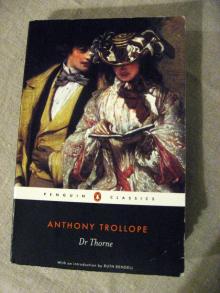 Doctor Thorne
Doctor Thorne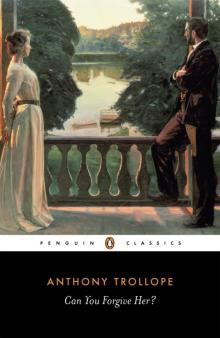 Can You Forgive Her?
Can You Forgive Her?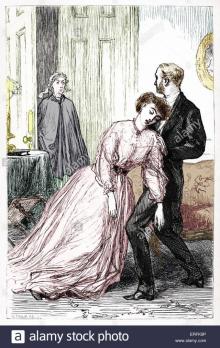 The Last Chronicle of Barset
The Last Chronicle of Barset The Fixed Period
The Fixed Period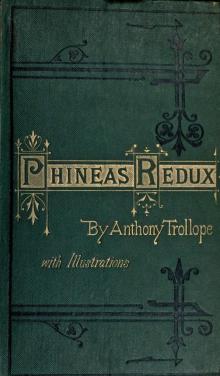 Phineas Redux
Phineas Redux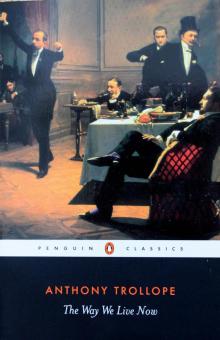 The Way We Live Now
The Way We Live Now Castle Richmond
Castle Richmond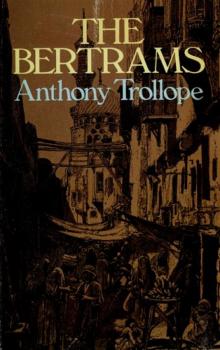 The Bertrams
The Bertrams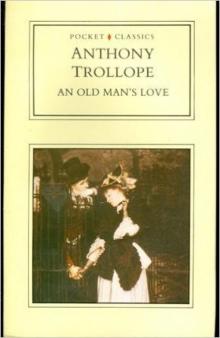 An Old Man's Love
An Old Man's Love The Belton Estate
The Belton Estate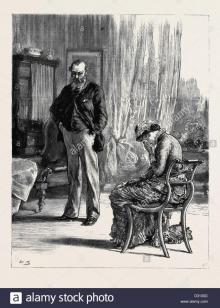 Marion Fay: A Novel
Marion Fay: A Novel The Claverings
The Claverings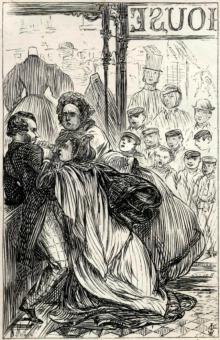 The Struggles of Brown, Jones, and Robinson
The Struggles of Brown, Jones, and Robinson Nina Balatka
Nina Balatka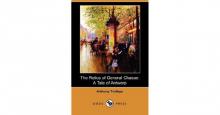 The Relics of General Chasse: A Tale of Antwerp
The Relics of General Chasse: A Tale of Antwerp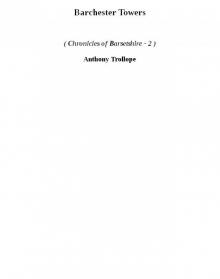 Barchester Towers cob-2
Barchester Towers cob-2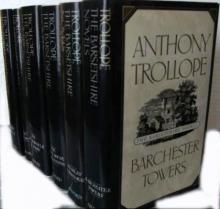 The Chronicles of Barsetshire
The Chronicles of Barsetshire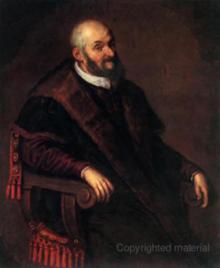 The Warden cob-1
The Warden cob-1 Framley Parsonage
Framley Parsonage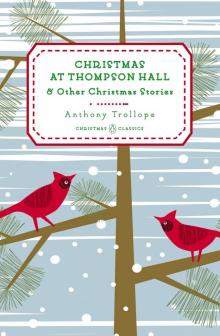 Christmas at Thompson Hall
Christmas at Thompson Hall The Warden
The Warden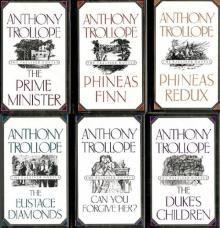 The Palliser Novels
The Palliser Novels The Small House at Allington
The Small House at Allington Barchester Towers
Barchester Towers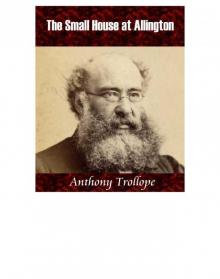 The Small House at Allington cob-5
The Small House at Allington cob-5 The Duke's Children
The Duke's Children Phineas Finn, the Irish Member
Phineas Finn, the Irish Member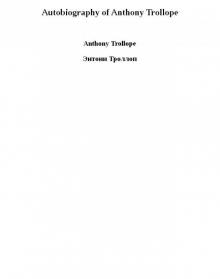 Autobiography of Anthony Trollope
Autobiography of Anthony Trollope